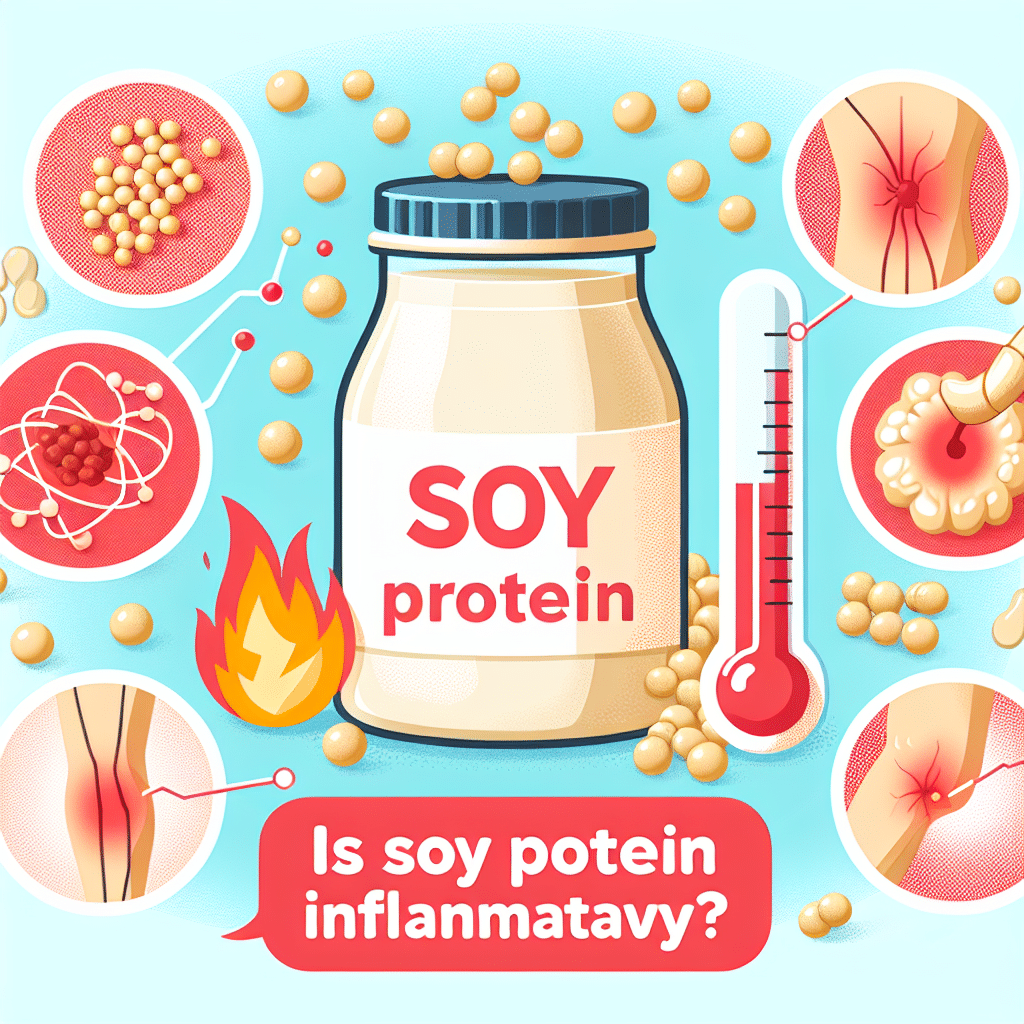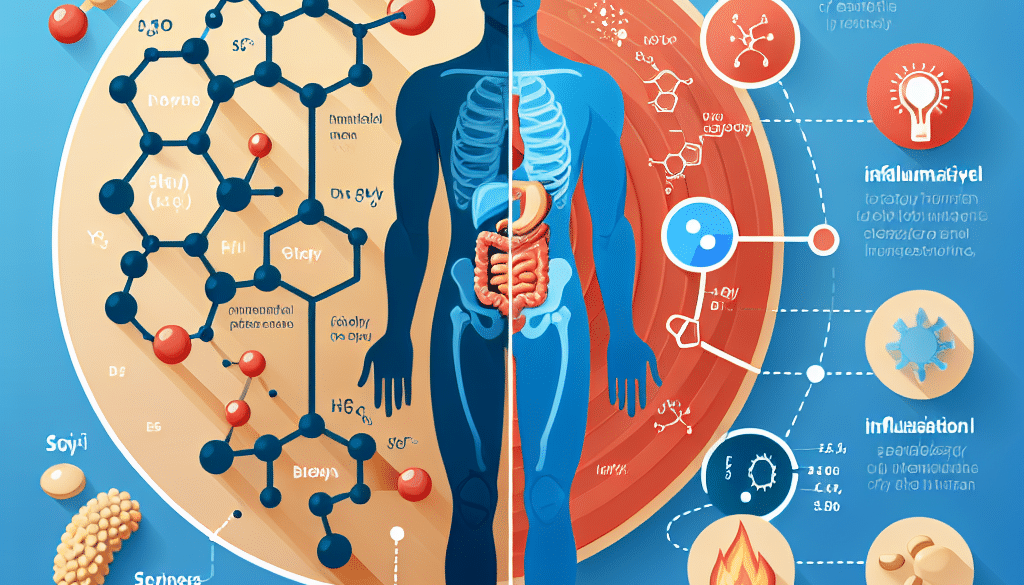Is Soy Protein Inflammatory?
-
Table of Contents
- Soy Protein and Inflammation: Unraveling the Truth
- Understanding Inflammation and Dietary Impact
- The Nutritional Profile of Soy Protein
- Investigating the Inflammatory Potential of Soy Protein
- Anti-Inflammatory Effects of Soy Protein
- Neutral Impact on Inflammation
- Potential Pro-Inflammatory Concerns
- Case Studies and Population Research
- Impact of Processing and GMOs on Soy Protein Inflammation
- Personal Health and Soy Protein Consumption
- Conclusion: Is Soy Protein Inflammatory?
- Discover ETprotein’s High-Quality Soy Protein Products
Soy Protein and Inflammation: Unraveling the Truth

In recent years, soy protein has become a staple in the diets of many health-conscious individuals, vegetarians, and those seeking alternative protein sources. However, amidst its popularity, questions have arisen regarding its potential inflammatory effects. This article delves into the scientific evidence to explore whether soy protein is indeed inflammatory or if it can be a beneficial part of a balanced diet.
Understanding Inflammation and Dietary Impact
Inflammation is the body’s natural response to protect itself against harm. While acute inflammation is beneficial for healing, chronic inflammation can lead to various health issues, including heart disease, diabetes, and certain cancers. Diet plays a crucial role in managing inflammation, with certain foods known to exacerbate or reduce it.
The Nutritional Profile of Soy Protein
Soy protein is derived from soybeans and is a complete protein, containing all nine essential amino acids. It’s also rich in vitamins, minerals, and isoflavones, which are phytoestrogens that can have antioxidant properties.
- Complete protein source
- Rich in vitamins and minerals
- Contains isoflavones with antioxidant properties
Investigating the Inflammatory Potential of Soy Protein
Research on soy protein and inflammation has yielded mixed results. Some studies suggest that soy protein may have anti-inflammatory effects, while others indicate no significant impact or potential pro-inflammatory outcomes.
Anti-Inflammatory Effects of Soy Protein
Several studies have shown that soy protein can reduce markers of inflammation in the body. For example, a study published in the “Journal of Inflammation” found that soy isoflavones have the potential to decrease inflammation markers in postmenopausal women.
- Reduction in C-reactive protein (CRP)
- Decrease in interleukin-6 (IL-6)
- Lower levels of tumor necrosis factor-alpha (TNF-α)
Neutral Impact on Inflammation
Other research indicates that soy protein does not significantly affect inflammation levels. A study in the “American Journal of Clinical Nutrition” concluded that soy protein consumption did not alter inflammatory markers compared to other protein sources.
Potential Pro-Inflammatory Concerns
Conversely, some studies have raised concerns about soy protein’s potential pro-inflammatory effects, particularly in individuals with soy allergies or sensitivities. These cases are relatively rare and often involve other underlying health issues.
Case Studies and Population Research
Population studies in Asian countries, where soy consumption is high, often show lower rates of inflammatory diseases. However, these observations must be considered within the context of overall dietary patterns and lifestyle factors.
Impact of Processing and GMOs on Soy Protein Inflammation
The way soy protein is processed can also influence its inflammatory potential. Highly processed soy products may lose some of their beneficial properties and could contain additives that contribute to inflammation. Additionally, the debate over genetically modified organisms (GMOs) in soy production adds another layer of complexity to the discussion.
- Highly processed soy products may be less beneficial
- Additives in processed foods can contribute to inflammation
- GMO soy is a contentious topic with potential health implications
Personal Health and Soy Protein Consumption
Individual health conditions, such as soy allergies or sensitivities, can dictate whether soy protein is inflammatory for a person. It’s essential to consider personal health history and consult with a healthcare provider when incorporating soy protein into the diet.
Conclusion: Is Soy Protein Inflammatory?
The evidence suggests that soy protein is not inherently inflammatory for most people and may even have anti-inflammatory benefits. However, individual responses can vary, and the quality and processing of soy products are critical factors. As with any dietary choice, moderation and a focus on whole, minimally processed foods are advisable.
Discover ETprotein’s High-Quality Soy Protein Products
If you’re looking to incorporate soy protein into your diet, ETprotein offers a range of high-quality protein products that can meet your needs. Their organic, non-GMO soy protein is produced with the highest standards, ensuring you receive the nutritional benefits without the concerns of additives or genetic modification.
ETprotein’s offerings are characterized by their neutral taste and allergen-free attributes, making them an excellent choice for those seeking to manage inflammation through diet. With a commitment to purity and quality, ETprotein is the go-to source for your soy protein needs.
About ETprotein:
ETprotein, a reputable protein and L-(+)-Ergothioneine (EGT) Chinese factory manufacturer and supplier, is renowned for producing, stocking, exporting, and delivering the highest quality organic bulk vegan proteins and L-(+)-Ergothioneine. They include Organic rice protein, clear rice protein, pea protein, clear pea protein, watermelon seed protein, pumpkin seed protein, sunflower seed protein, mung bean protein, peanut protein, and L-(+)-Ergothioneine EGT Pharmaceutical grade, L-(+)-Ergothioneine EGT food grade, L-(+)-Ergothioneine EGT cosmetic grade, L-(+)-Ergothioneine EGT reference grade and L-(+)-Ergothioneine EGT standard. Their offerings, characterized by a neutral taste, non-GMO, allergen-free attributes, with L-(+)-Ergothioneine purity over 98%, 99%, cater to a diverse range of industries. They serve nutraceutical, pharmaceutical, cosmeceutical, veterinary, as well as food and beverage finished product distributors, traders, and manufacturers across Europe, USA, Canada, Australia, Thailand, Japan, Korea, Brazil, and Chile, among others.
ETprotein specialization includes exporting and delivering tailor-made protein powder and finished nutritional supplements. Their extensive product range covers sectors like Food and Beverage, Sports Nutrition, Weight Management, Dietary Supplements, Health and Wellness Products, and Infant Formula, ensuring comprehensive solutions to meet all your protein needs.
As a trusted company by leading global food and beverage brands and Fortune 500 companies, ETprotein reinforces China’s reputation in the global arena. For more information or to sample their products, please contact them and email sales(at)ETprotein.com today.














